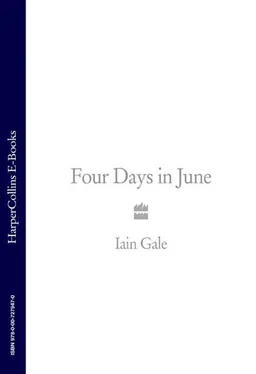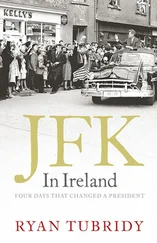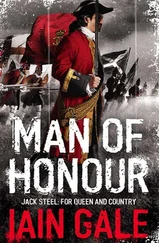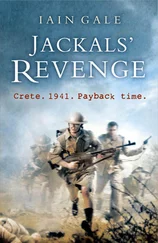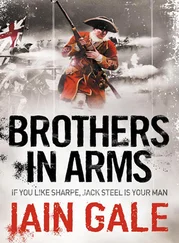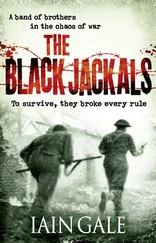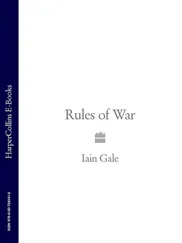He was unshaven. Three days, Ziethen guessed. His uniform was principally a filthy long brown overcoat, albeit with the familiar dark blue jacket beneath. His frayed yellow collar and tattered red and yellow epaulettes testified to his élite status as a voltigeur – a sharpshooter. Élite? , thought Ziethen. He had thrown away his musket. He was still laden down, though – with four days’ bread ration and extra cartridges – necessitated presumably by a lack of adequate transport. If this was all that Napoleon could throw at them they had nothing to fear. Secretly, though, the general knew that he was fooling himself. This sad man was not typical. That was why he was here – in the sombre, provincial dining parlour of Ziethen’s requisitioned headquarters on the outskirts of this godforsaken Belgian town. This fool. This brave coward. This deserter. He would not fight. But he was the exception. There were other men out there, beyond the river, and they, Ziethen knew, were different. They were hardened, they wanted to fight. And they were filled with hate. Hate for the Prussians. Hate for men like him.
There was food on the table, and a bottle of local wine. He had been about to eat when they had dragged the wretch into the room. Conscious now of the Frenchman’eyes, focused on the thin chicken leg in his hand, Ziethen threw the bone into the fire and, somewhat obviously, he realized, wiped his greasy fingers on the scarlet turnback of his own dark blue coat.
The Frenchman took off his shako, revealing lank, greasy hair. He spoke. But the accent was too provincial; the words too garbled. Ziethen’s Chief of Staff, the laconic, educated von Reiche, managed a rough, staccato translation:
‘He says, sir, that he is from the 13th Regiment of the Line. From Count d’Erlon’s corps. That they have been camped for some days near Beaumont, to the south west of us. His whole regiment was there – three battalions. Around 1,200 men, he thinks. But some have left – like him. Some of his friends. And some have died. They came there from Lille. He says that to reach our lines he had to walk ten kilometres. It’s another ten to here. He came through what he thinks was another French corps. A lot of men. Perhaps 20,000. All arms. He saw infan try, many cannon, lancers, chasseurs. One of his friends was shot, two others captured by the gendarmes. He says it was very frightening. He does not want to fight. He says that he would like to help, sir.’
The Frenchman smiled, feebly. Since yesterday Ziethen had expected something to happen. But up till now just where it would come had been unclear. This man was all that he had hoped for. But could he be trusted? He desperately wanted to believe so. Outside there was a heavy mist. His pickets could see nothing. Even the keen-eyed Hussars of his own old regiment, the 4th, had returned with no information. Anything would be of help. He tried to interpret the news, to ignore the Frenchman’s terrified, plaintive gaze.
‘Get him a drink.’
‘General?’
‘A drink. Get the man a drink. Wine. Water. Get him a cup of water. And a chair.’
A guard produced a battered tin cup; water was poured. Ziethen picked up the wine and poured a little into the water. A grenadier brought one of the few chairs which had not been taken by the owners of the house or broken up by his men for firewood. The Frenchman sat down, took a long drink and forced a smile. He was sweating. From outside the window a sudden burst of laughter and the sound of a smashing bottle made the man turn his head. Below in the courtyard Ziethen’s junior officers were enjoying themselves. Trying to forget the dawn; the battle they knew must come.
‘Ask him what Napoleon is doing now. Where is he crossing the river? Is he concentrating his men in one place. Is he coming here? To Charleroi? Ask him.’
The Frenchman looked worried again. He answered the questions quickly. Too quickly? Ziethen tried to gauge his reaction, his honesty.
‘He says that there are rumours. That Napoleon has sent to Paris for Ney. That the Belgians in Wellington’s army will desert and side with the French. That Wellington will abandon Brussels and make for the coast.’
Ziethen had heard the rumours too. There were always rumours before a battle. He was more concerned with the reliability of the information which might win them the coming battle. So he humoured the man; allayed his fears; gave him confidence, and more wine and, little by little, learned through the garbled reports that the Emperor had issued the order to march towards the Sambre. Then his tone changed. A final test.
‘Why did you desert?’
The Frenchman swallowed hard and began. He had no love for the Emperor. For France, yes. But Napoleon? He spat at the floor. He had lost three brothers in the past ten years’ fighting. He was a farmer, from Normandy. Not a soldier. He had two sons. He wanted peace. His eyes filled with water.
Ziethen smiled. It was good. This was no rehearsed deception. And it made sense. The Emperor was about to attack – at Thuin. He intended to concentrate one wing of his army. An entire wing, aimed here. Towards Charleroi. It would hit Steinmetz’s brigade head on. Napoleon planned to split the allies before they could join forces. Then he would destroy them in detail. Little by little, with his classic strategy of the central position. It was brilliant. Obvious. Dangerously simple. All he had feared. Ziethen needed to move quickly. Blü cher would act, would march to the battle. Of Wellington he was not so sure. Wellington, the hero of Spain, with his ragbag army of British, Dutch, Belgians and Hanoverians. How would they behave when faced with the might of the Empire? Would they stand? Oh, Wellington wouldn’t cut and run. But would he come to their aid? There was no time to find out. If Napoleon was to be stopped the Prussians at least would be ready for him.
‘Reiche. Send a despatch to Field-Marshal Blü cher. Tell him that Napoleon is about to attack me at Thuin. Make sure that the message gets through to Lord Wellington. Oh, and this time don’t forget to copy it to General von Gneisenau. We wouldn’t want to upset the delicate etiquette of the high command, would we?’
He and Gneisenau had never got on. Ziethen hated the jumped-up Saxon, with his clever army reforms and the deft political manoeuvring that had raised him to Army Chief of Staff. And he knew that Gneisenau loathed him. That he had attempted to block his appointment as corps commander. But Papa Blü cher’s word was final. Now he would repay the old man for his confidence. As Reiche hurried from the room, Ziethen turned to the captain of the guard.
‘Now take this fellow outside and give him something to eat. Then tie him up, and if he tries to run, shoot him.’
As the Frenchman left, Ziethen wondered, as he often wondered, how Napoleon had ever achieved the marvels of the past fifteen years. The French did not make war like Prussians. They had no code of discipline. Too often he had seen soldiers whose dress had almost rivalled that of his recent guest. They were badly drilled and often poorly led. But these were the men who had conquered Europe, who had not so long ago controlled an empire which had stretched from the coast of Spain to the Russian steppes. It had been Napoleon’s vanity that had undone them. Just as his ego had been the making of France, so it had been her downfall. But the fact was they had done it. And despite all that he knew and all that he had seen, Ziethen still wondered how.
Some men spoke of ten years of war, some of fifteen. But Ziethen had been fighting this war, fighting the French, for a quarter of a century. He had been there as a young hussar officer at the storming of Frankfurt. There at Valmy in 1794, when Napoleon had been merely Buonaparte, the precocious young Corsican Colonel of Volunteers. He had seen a ragged French revolutionary army throw back the mighty Prussians and had known at that moment that his life would be spent in defeating them. At Jena-Auerstadt in 1806 he had earned command of his regiment. Then had come promotion to the staff. The memories came fast. The faces. The dead friends. Names. Voices. Their peculiar laughs. Their eccentricities. They came as they came often to him in the dark, silent hours. Their names. Their faces. Most of all their voices.
Читать дальше
